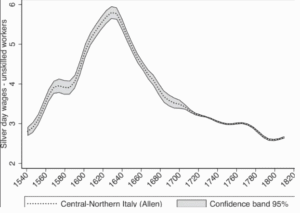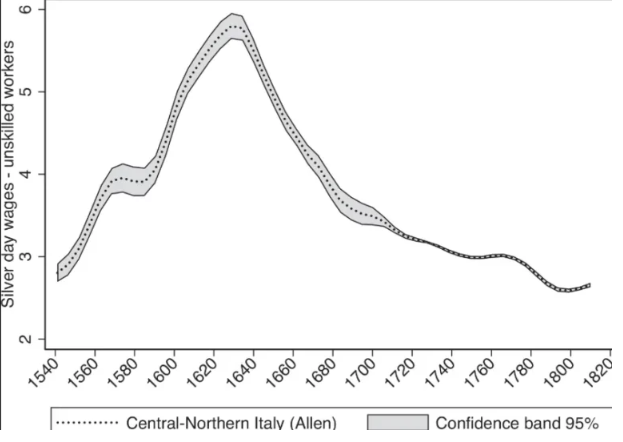Earnings and average wages in Italy – statistics & facts
Whether you’re planning to work in Italy, relocate, or are simply curious about the economic landscape, understanding the average wage in Italy is key to setting realistic expectations. While Italy is known for its rich culture, stunning landscapes, and enviable lifestyle, the financial aspects of living and working there can vary drastically depending on where you live, your career field, and your level of experience.
In this in-depth guide, we’ll break down the average wages across regions and sectors, explore gender and regional disparities, and highlight key economic indicators such as unemployment rates and work hours. We’ll also compare Italy’s average salary levels to those in other European nations and outline how salaries change based on education, industry, and job position.

What Is the Average Wage in Italy?
The typical gross salary in Italy is around €36,000 per year, which is approximately €3,000 per month before taxes. After tax deductions (which average about 28%), the net salary or take-home pay is about €26,000 annually, or roughly €2,200 per month.
In regions like Lazio—home to the capital, Rome—this is considered a standard salary range. However, it’s important to understand that salaries differ not only by profession but also by geographic region, industry, and even gender.
If you’re in Lombardy, particularly in Milan, you can expect to earn significantly more. The average gross salary there reaches €40,400 per year, pushing the monthly take-home pay to around €2,400, or about €200 more per month than the national average.
Earnings Key Factors Influencing Salary in Italy
1. Region Matters: North vs. SouthOne of the most important factors influencing wages is location. Italy is marked by a sharp economic divide between the North and the South.
Northern cities such as Milan, Turin, Parma, Venice, and Verona consistently offer higher salaries, often tied to the presence of international companies, advanced manufacturing, finance, and tech hubs. These cities are better integrated into the European economy and offer more competitive wages.
In contrast, southern regions like Calabria, Puglia, and Sicily tend to have lower average wages, fewer high-paying industries, and higher unemployment rates. The South is more reliant on agriculture and tourism, sectors that traditionally offer lower wages.
2. Field of Work
Just like in most countries, your industry heavily impacts how much you earn in Italy. Here’s a breakdown of average gross monthly salaries by field:
- €1,500/month: Nannies, childcare workers, retail employees, and cashiers
- €2,000/month: Administrative assistants, tourism workers, food service, journalists, and security
- €2,500/month: HR professionals, educators, marketing and PR, construction workers, and sales managers
- €3,000/month: Accountants, finance professionals, legal professionals, IT support, and pharma staff
- €3,500–€4,000/month and up: Engineers, software developers, pharmacists, architects, doctors, and air traffic controllers
The top-earning sectors are generally found in business management, medical fields, IT, and engineering.
3. Experience & Education
As expected, the more experience and education you have, the more you’ll likely earn in Italy. For instance, a senior developer or a medical specialist with 10+ years of experience will earn far more than someone just entering the workforce—even within the same industry.
Italy places high value on degrees from reputable universities, and advanced education (such as a master’s or PhD) can significantly boost your earning potential, particularly in academic, technical, and legal fields.
4. Gender Pay Gap
Gender inequality in wages persists in Italy, though it’s not as stark as in some other countries. On average, Italian men earn 5% more than women in comparable positions. This gap is wider in certain industries like finance and construction and narrower in education and healthcare.
Earnings Italian Unemployment and Work Culture
Unemployment Rate
The average unemployment rate in Italy was around 10% in 2019, with the youth unemployment rate (ages 20–24) reaching 29%, and around 18% for those aged 25–29. This is 3.4 times higher than in the United States, where youth unemployment hovered around 8.5% during the same period.
This high youth unemployment is a serious issue and suggests that younger people—particularly recent graduates—may struggle to find stable, well-paying jobs in Italy unless they work in specialized fields or relocate to the North.
Earnings Working Hours
The average Italian workweek is between 37 to 40 hours, although about 10% of workers reportedly put in over 48 hours per week, especially in sectors like law, consulting, and private business. Despite the laid-back reputation of Italian culture, the work pace—particularly in competitive fields—is demanding.
Earnings Income Inequality in Italy
Italy has a notable income inequality gap. According to recent data, the top 20% of earners in Italy take home almost six times more than the bottom 20%. This reflects disparities in education, regional development, gender, and access to skilled jobs.
Comparing Italy to the Rest of Europe
When comparing average wages across Europe, Italy falls somewhere in the middle:
- Below: Denmark, Sweden, Switzerland, Germany, and France
- Above: Spain, Portugal, and Greece
While Italy offers a relatively lower average salary compared to some northern European countries, it compensates in other areas such as lower living costs (in some regions), public healthcare, extended holidays, and work-life balance, particularly in smaller cities and rural towns.
Gross vs. Net Salary: What You Actually Take Home
Taxes in Italy can take a significant bite out of your gross salary. On average, about 28% of your income goes toward income taxes and social contributions.
- Gross salary: €36,000/year
- Net salary: €26,000/year
- Monthly net: ~€2,200
Keep in mind that self-employed individuals and freelancers in Italy are taxed differently. They often pay higher contributions to the national pension system (INPS), so their net take-home income might be lower unless they set up a favorable tax regime such as the “regime forfettario” (flat-rate regime).
Can Foreigners Earn More?
Yes—particularly if you’re relocating to Italy with a foreign company, working remotely, or entering high-skill sectors like IT, engineering, or finance. Expats from the U.S., Canada, and the UK often retain higher salaries than local Italians when working remotely or under foreign contracts.
However, if you’re planning to integrate fully into the Italian workforce with a local contract, expect your earnings to match the average wages in your sector and region.
Final Thoughts: Is Living and Working in Italy Worth It?
Living and working in Italy offers a balance between lifestyle and income. While the average wage in Italy may not match what you’d earn in countries like Germany or Switzerland, the quality of life in many Italian cities remains high—thanks to affordable healthcare, accessible public transport, scenic beauty, and strong social networks.
But it’s essential to plan accordingly. Do your research about salaries specific to your profession, compare regional differences, and make sure you understand the net salary you’ll actually take home.
In short, success in Italy depends on where you work, what you do, and how much experience you bring. For those with the right background—or the flexibility to work remotely—Italy can be an incredibly rewarding place to live and build a career.
Looking for more details? Check out this in-depth breakdown of what is the average wage in Italy and how it compares across industries and cities.
